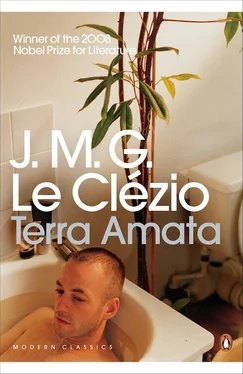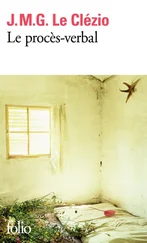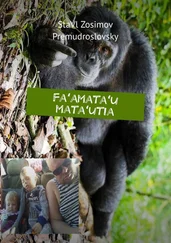And then you’d need to go further still. You’d need to have left this blue planet and rummaged around in space. To have been born millions of light-years away on an earth of metal or mercury, with a red sky and six tiny suns spinning round the horizon.
You’d need to have waited for centuries and centuries and seen the mountains slowly worn away by the wind and the sea drying up in its bed like a pool of petrol. Other species might come, and other cataclysms. A sudden gash might open in the midst of the land, and tons of lava pour out and gradually cover the whole planet.
Or you could go backwards in time and creep all hairy through the hostile jungle. Huge animals with sharp claws would lurk in the depths of the forests and you would flee with beating heart. And in the evening, crouched in a tiny cave, you would make odd scrawls with a stub of charcoal to try to tell what happened during the day.
You’d have had to do all that to be really happy. You’d have had to live all those lives at once to be happy as a god. But obviously it wouldn’t have been very easy.
So, like Chancelade, you got up at night because you couldn’t sleep. Outside in the darkness the animal cries echoed strangely. Toads croaked on the other side of the valley, calling to one another from hundreds of yards apart. Drunken crickets whirred crazily. In the yard of some sinister invisible house a dog howled in fear. Everywhere arose mysterious creaks, tiny reports, scrapings, buzzings, rustlings of wings — all telling that the house, the whole world, was a prey to the army of unknown insects. And somewhere in the garden, hidden in the heart of a tree, a nightingale uttered every six seconds its artificial cry, that always contained three words:
‘Phui phui, rrrwoooïïï, rrrhouyouyou’
‘Koutyou, kreuhühü, hui, hui hui’
‘Hou hou hou, huïtheu, kut’
‘Hapuuuu, hahui hahui, hou hou hou’
‘Frrriiooo, krieu, pou-tou pou-tou’
‘Houhüüü houhüüü, pioo pioo pioo, trrriiit’
‘Phui phui, phuu prriootyou huitki, kooo’
You leaned your head against the cold window and tried to look out through the slits in the shutters. But all you could see was a great formless darkness, with perhaps the misty star of a street-lamp in the distance. Then you listened to all the sounds that unfurled in disorder in the night, and they became a sort of strange language telling the long long history of living life. And little by little you realized that you knew all these words, all these names, and that in a way you’d always known them. What they said was simple: they told of battles, of flights through the air or the grass, of food spied on for hours and stolen in a flash. They also told stories of love, of the urgent appeals from the female to her mate, and the lewd scents that madden across miles of separation. Bodies were ready to couple, and sought one another through the labyrinth of night. Feathers were sleek, eyes bright, muscles flexed. They told stories, too, of eggs that must be laid in a warm place, and larvae swelling in their cocoons. All these stories were alike yet each was different. The novelty of life was endless, and adventures repeated themselves over and over unceasingly. The stories paralleled one another, phrases learned by heart and never forgotten; they called to one another; passed one another in the evening air; bored their way through the night; and they all came together blindly and by chance to make up the greatest story of all, the most beautiful, the one and only story that never finishes being told.
There was also that other day, a real day of conflagrations. A day with boiling sun, white haze, east wind, motionless mountains, motionless sea, motionless sky, sweat on the back and under the armpits, shirt sticking to you, and a black storm riding the horizon. The boy Chancelade had left the house immediately after lunch and walked through the streets of the town towards the sea. He’d put on a red sweater with white stripes, and round his neck he wore his beautiful new green towel. He’d stuffed it into his satchel before he came out so that his parents wouldn’t see he wasn’t going to school. Then he’d hidden his satchel in a disused drainpipe, keeping only his beautiful green towel, which he hung round his neck. He’d walked in the sun, he’d crossed several intersections with nobody about, gone through streets silent and deserted. He’d gone by a hot garden where an old man in blue trousers and a straw hat was raking the grass into heaps. He’d dragged his feet through the dust, he’d walked along the tops of walls. He’d crossed a level-crossing. He’d picked up a round stone with a hole in it and thrown it at a cat that was sitting between the wheels of a car. In this way he’d crossed the whole belt of villas, houses, kitchen gardens and waste land that you had to go through to get to the sea. Sometimes he’d walked fast, sometimes slowly, whistling, singing, talking to himself, or saying nothing. But every so often he whirled his beautiful green towel round his head like a sword. He’d passed several boys and girls on their way to school, walking in twos and threes in the opposite direction. He’d looked at them scornfully because he knew about five or six of them — Delpire for example, and Villand, Roussel, Gioffret, Dunan, Maryse, Falchetto, Chantal and Calmet — and they were on their way to school whereas he had decided not to go any more. They had turned round to watch him go by, and must have said something like:
‘Did you see him? He’s going swimming.’
‘We ought to tell, that’d teach him.’
‘Yes, they’d chuck him out for sure.’
Then they’d gone on to something else — Delpire’s father’s new car, probably.
When he got to the boulevard that led to the sea the boy had bought himself an ice-cream cone. He’d been wanting to do that for a long time: go swimming on a Friday during algebra, and buy a big ice-cream cone. The woman at the stall looked at him and said:
‘What flavour?’
‘What flavours are there?’ he asked.
‘Vanilla lemon coffee strawberry chocolate,’ said the woman.
‘Vanilla strawberry,’ Chancelade said.
‘Vanilla strawberry,’ she repeated.
Then he went on down the boulevard licking his ice. When the ice-cream was finished Chancelade threw away what was left of the cone and wiped his hands on his beautiful new green towel.
A little way further and he was at the beach. It was a level stretch of flat pebbles with a narrow strip of white sand at the water’s edge, dumped there by lorries for the tourists. The boulevard still continued parallel to the beach and the boy walked on for a while to find a good place. There were lots of people on the beach. Fat men, fat women and fat children lay on the stones, their pink skins gleaming with sun-tan lotion. Beside them were hampers of provisions, rubber life-belts, transistors or dogs. A kind of strong odour, sweat perhaps, or the alkaline smell of water and urine mixed, wafted up from the flat sunny beach. You could hear shouts too, sudden exclamations, the squeals of little girls, twangs of music. Chancelade sat down on the low wall separating the beach from the road and watched, holding on to both ends of the green towel round his neck.
He watched a hairy man picking his way carefully towards the water so as not to hurt his feet. He waded in till the water was halfway up his thighs then plunged forward and disappeared. In the other direction, to the left of a heap of sea-weed and rubbish, a three-year-old in a cap suddenly started to howl because he’d been stung by a wasp; Chancelade watched his mother come and carry him away. An Alsatian lay blinking and panting under a big striped sunshade. And nearby a girl with fair hair slowly rubbed cream into the back of another girl with dark hair.
Читать дальше












